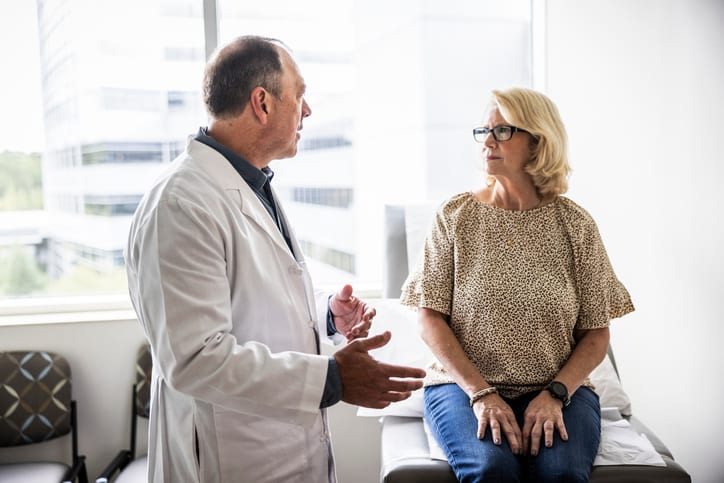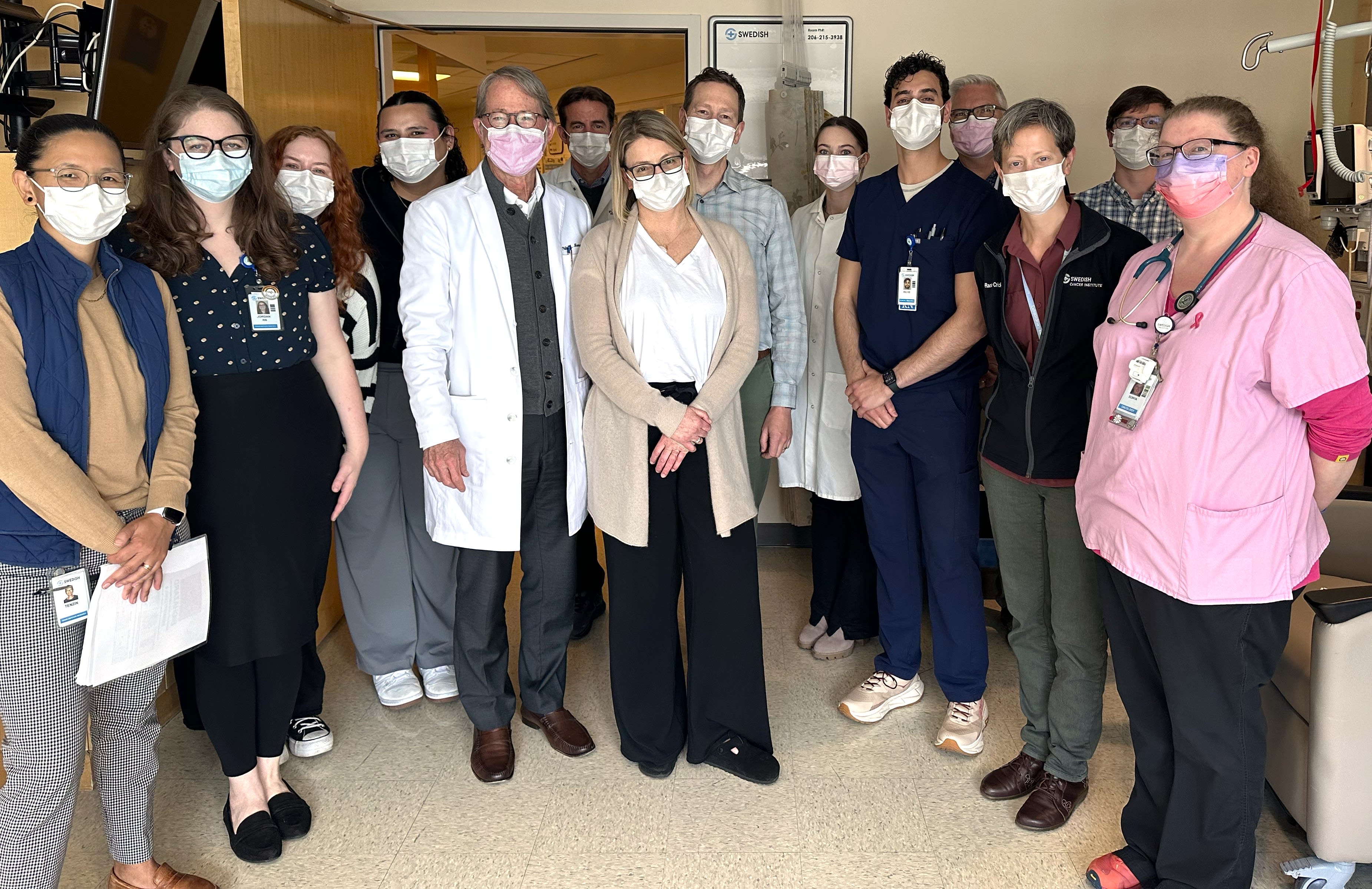New hope on the horizon for brain tumor patients
[5 MIN READ]
In this article:
-
Roughly one million Americans live with a brain tumor, and nearly 95,000 more are expected to receive a primary brain tumor diagnosis this year.
-
Clinical research at The Ivy Center at Swedish provides innovative options to diagnose and treat brain and spine tumors of all types. Learn why our experts see “new hope on the horizon.”
-
May is Brain Tumor Awareness Month, dedicated to raising awareness about brain tumors and their life-altering impact on your physical, mental and emotional health.
The treatment options currently available to patients with glioblastoma brain tumors – surgery, chemotherapy and radiation – have been the standard of care for more than a decade, making it one cancer that hasn’t benefited much from recent advances.
Yet.
“For the first time in a long time, it looks like there’s some new hope on the horizon,” says Charles Cobbs, M.D. Dr. Cobbs is the Gregory Foltz, M.D, Endowed Director of the Ben & Catherine Ivy Center for Advanced Brain Tumor Treatment.
May is Brain Tumor Awareness Month. We talked to Dr. Cobbs about the research his team is doing and the life-changing impact it could have on people with malignant brain tumors. Here’s what he shared.
Translational research for personalized treatment
Most of the ongoing brain cancer research and treatment at The Ivy Center involves adult brain tumors called glioblastomas, according to Dr. Cobbs. Studies focus on developing real-life solutions that improve patient outcomes.
“We do translational research,” says Dr. Cobbs. “That means we focus on studies that allow us to take the knowledge we learn from a patient and immediately use that information to develop personalized therapies.”
The Ivy Center Biorepository is an essential part of the process. “The biorepository houses all brain tumor tissues, patient-derived cell lines and blood samples we take from our patients. It is a valuable resource that allows us to build on our knowledge and collaborate with researchers at other leading institutions,” says Dr. Cobbs.
“We have a unique position at The Ivy Center because almost everything we do is based on information we get from tumors we’ve taken out of patients or tumor cells that we’ve grown from patient tumors,” he explains.
“A lot of really world-famous research institutes will often be studying things that are many steps removed from a human patient,” adds Dr. Cobbs. “But at Swedish, we have a unique ability to look at actual patient tissues. I take them out of the patient in the operating room. Within minutes the samples are in the laboratory, where we can do treatments and study them to get immediate insight into what could help the patient. That gives us a huge advantage.”
Building on past success
Researchers recently completed a Phase 1 study that tested a new approach to administering off-label medication if a brain tumor recurs or progresses after radiation and chemotherapy. Off-label means the medication is being prescribed for something other than what the Food and Drug Administration approved. This approach takes advantage of existing medications with cancer-fighting potential and offers additional options to people who can’t wait.
“We took tumor cells from the patient, grew the cells in the lab and then tested them against a panel of compounds to see if we could figure out which drugs and compounds would affect their growth,” says Dr. Cobbs. “Then we took each patient’s top three and administered them in a highly personalized medication cocktail. The results were promising. We showed good safety for all patients in the study and a hint of improvement in survival rates for some patients in the study.”
Positive results prompted a second Phase 1 trial using medication combinations tailored to each patient’s needs. This time the medication will be given at the same time as chemotherapy and radiation instead of waiting for a recurrence. The study is expected to begin enrollment in July.
“We now know that between the first surgery and when the tumor comes back, it can go from apples to oranges in terms of the tumor cells because they’ve been treated with radiation and chemo,” says Dr. Cobbs. “We’ve gotten approval to give the three medications right after surgery alongside the standard treatment. We think it could be much more effective at that time. It could be pretty exciting if this trial shows improved patient survival.”
Blazing a new path
According to the National Brain Tumor Society, about one million people in the United States are living with a brain tumor diagnosis. Nearly 95,000 more are expected to be diagnosed this year. And – despite medical advances – five-year survival rates are only about 5%.
Several factors make effective treatment of glioblastoma so tricky, according to Dr. Cobbs.
“Brain tumors have an extraordinary amount of immunosuppression, so the immune cells don’t even get in there,” he explains. “There’s also a problem with the delivery of some chemotherapy drugs because the brain has a way of preventing those drugs from getting in through what’s known as the blood-brain barrier. In addition, these tumors are just extraordinarily quick to resist treatments. And they tend to come back.”
Innovative research at The Ivy Center is fueled by philanthropy. “Donor support forms the foundation for everything we do,” says Dr. Cobbs. “Through donor support we’re able to secure major federal funding for research projects that could lead to new treatments. The generosity of our community is helping improve how brain tumors are treated in the future.”
The Ivy Center was recently awarded a grant from the National Cancer Institute to study drug resistance and glioblastoma. Working in partnership with the Institute for Systems Biology (ISB), they will attempt to decipher which genes are responsible and develop individualized regimens of FDA-approved drugs.
“In addition to the drug studies described above, we are working to identify genes that frequently pop up in brain tumors. And then, the ultimate goal would be to make a vaccine to teach your immune system to kill any cell with those genes,” says Dr. Cobbs.
“Pharmaceutical companies will be doing studies and trying to come up with one blockbuster drug that could treat everybody. But those approaches have not worked at all for brain tumors,” he adds. “We believe successful treatment will either involve personalized drug therapy or personalized immune therapy.”
--
Learn more and find a provider
Swedish Virtual Care connects you face-to-face with a nurse practitioner who can review your symptoms, provide instruction, and follow up as needed. If you need to find a provider, you can use our provider directory.
Join our Patient and Family Advisory Council.
Related resources
Learn about brain tumor symptoms and treatments
A vaccine for brain cancer? Swedish researchers are working to make it happen
This information is not intended as a substitute for professional medical care. Always follow your health care professional’s instructions.
Follow us on Facebook, Instagram and Twitter.




